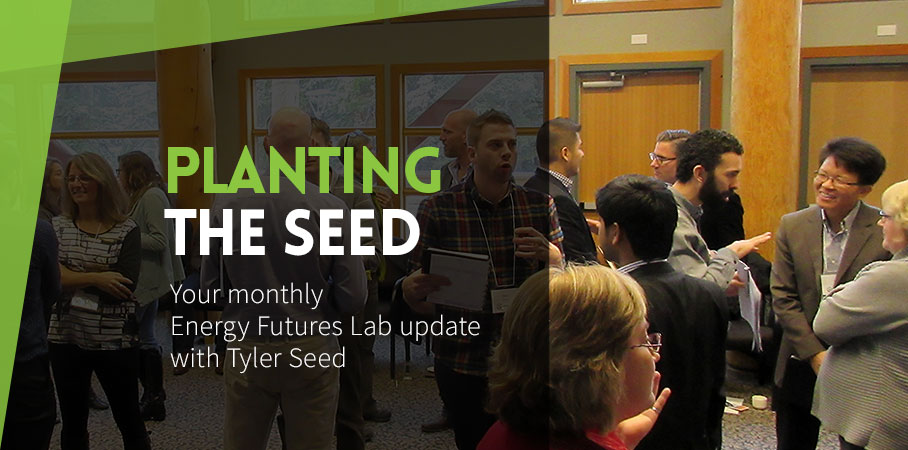
Imagine 20 years of energy transition condensed into an immersive half day simulation.
The Newtonian Shift drops you into the outdated, inefficient, polluting energy system of Newtonia. You may find yourself working for a utility, or a bank. Or maybe you are a First Nations leader, oil and gas producer, or the director of an environmental non-profit.
As the population grows and the impacts of climate change become impossible to ignore, the leadership and citizens of Newtonia call on actors across the system, including you, to work together to transform your country’s energy system into one that is sustainable and able to meet the needs of the future. It’s up to you to make it work while dealing with outages, supply disruptions, and shifting government regulations.
If this sounds familiar, I’m glad you’ve been paying attention.
“You can talk or read about a system, but The Newtonian Shift gives you the visceral experience of being at the centre of change. It’s fun, it’s intense, and provides real insights.”
Cheryl De Paoli, Executive Director of AREF
“I went in with fairly high hopes and they were more than exceeded.”
Imre Szeman, Canada Research Chair in Cultural Studies at the University of Alberta and Co-Director of the Petrocultures Research Group
Versions of The Newtonian Shift have been played by energy leaders in Europe, Ontario, and California, but the Energy Futures Lab version is customized to reflect the Alberta experience by including roles for First Nations and the oil and gas sector.
The Newtonian Shift plays a central role in EFL’s public engagement strategy. Two sessions were run at the GLOBE conference in Vancouver earlier this month and with the generous support of the Alberta Real Estate Foundation (AREF), the game will be played communities across Alberta over the course of 2016.
Cheryl De Paoli, Executive Director of (AREF), and EFL Steering Committee member explains that, “People need to know where their energy comes from, and they need to understand what it actually means to talk about renewables and innovation. We have to get beyond this Us vs. Them argument, and real energy literacy is going to be a big part of getting us there.”
_____
But what could the Fellows, with such impressive combined knowledge and experience in energy, possibly get out of playing such a game? About a third of the Fellowship played the game during the January Backcasting Workshop in Edmonton, and here’s a little of what we heard.
- A platform for Experimentation. We can try things in a game that we cannot just try in real life.
We’ll never design a perfect model of something as complex as Alberta’s energy system, but our ability to run experiments in the real world is extremely limited. Being able to play out interventions over years and across an entire system, even in simulation, can help us to identify promising avenues to pursue in the real world, or understand why an initiative that might seem promising could face unforeseen barriers.
Matt Beck, Coordinator of Sustainability and Innovation at Husky Energy Inc, explains that, “You can’t gain the insight you need without using proxies to glean information on how different forces can interact and how dynamics can unfold. The game is a tool to enable experiments like that.”
- Perspective shifting. Games let us be someone else.
Over the course of a career we can only have so many jobs, and we may not all get the chance to be the CEO of a major corporation, manage a clean-tech startup, or negotiate on behalf of a First Nations community.
The Fellows come from across Alberta’s energy system, bringing their own unique points of view. Some may recently have seen each other as adversaries, but now they’ve been brought together to collaborate. What they are quickly realizing, and what the Newtonian Shift drives home, is that things often look very different from the other side of the table.
Gerardo Marquez, Project Manager for the Alberta Electricity System Operator sees real value in the opportunity to experience fresh perspectives: “If you are an electricity provider you may only deal with a few other players, but maybe not others, like policymakers. This game allows you to see the other components that are sometimes hidden from your usual point of view.”
- Experience of the transition – In a game you don’t just learn something, you live it.
The Newtonian Shift gives players the visceral experience of what a transition is like and the type of collaboration that is needed in order to make it happen. The bird’s eye view and time compression of the game world allow players to feel the system and the shift. Interrelations and dynamics are revealed and internalized in a way that can’t be achieved through readings, presentations, discussions or clever facilitation.
Imre Szeman, Canada Research Chair in Cultural Studies at the University of Alberta and Co-Director of the Petrocultures Research Group puts it like this: “There are ways of learning experientially through a game that you just can’t do in other ways. A game like this isn’t about having a laugh. It’s a way of learning that you can’t do otherwise. It cuts to the chase as to what we’re doing, helping us learn and work differently to effect the kind of changes we want.”
The first two public game sessions, hosted in partnership with AREF will be held in Calgary and Edmonton in early April.
Whether you’ve been watching the Lab and interested in getting involved, you’re a fellow but didn’t get a chance to try the game in January, or just interested in energy or alternative learning experiences, coming out to one of these sessions will be an excellent opportunity to get a taste of what building the energy system of the future is going to take.

Tyler Seed The Natural Step Canada’s Business Development Manager. He holds a Master’s degree in Strategic Leadership Towards Sustainability from Blekinge Tekniska Högskola in Sweden.



